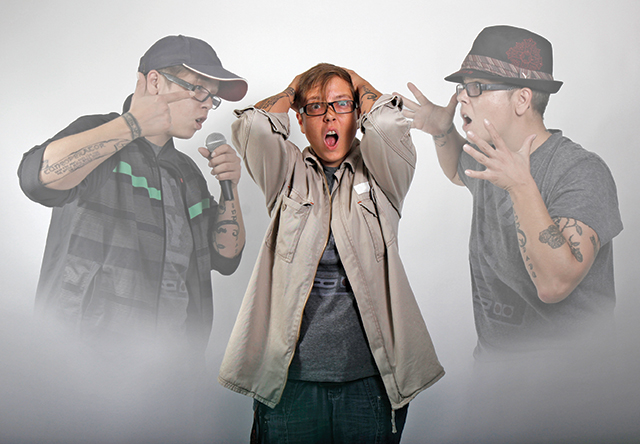
When I ask you what the voices in your head say, you either know exactly what I am speaking of or have associated ‘hearing voices’ with some sort of imbalance in the psyche; neither being wrong, I want to shed light on the fact that your own voice, the voice of your thoughts, is coming from three different parts of the self. You have probably heard the names of these three parts within you before; they are Conscious, Subconscious and Ego. You likely have a misinterpretation or even negative association with one or more of those words. Today, I am here to clear up those misconceptions and provide the information necessary for you to befriend these parts of yourself…to make your mind less of a battlefield and more of a safe haven.
Let’s start with that part of your mind referred to as the ‘Conscious.’ The Conscious is the voice of awareness, reasoning and intellect. It attempts to better us and seeks growth in a healthy, well-paced and safe manner. When a smoker has the thought, “I should stop smoking, these things are harmful to me,” the smoker has just had a conscious thought or realization. When someone who desires to lose weight makes the initial decision to do so, that was a conscious decision. Additionally, each time following that decision that this person declines a soda or a cookie, those too are conscious decisions. They are made from an intelligent perspective on the situation and perhaps the decision or realization was made because of an internal discussion/debate with the Subconscious.
Awareness is also an aspect of the Conscious. Perhaps you have heard someone say, “I am conscious of ____,” meaning they are aware of whatever it is they filled in that blank with. This is because that _____ is now at the forefront of their mind, it has their attention and awareness. “I am conscious of my arm,” “I am conscious of the fact I have a doctor’s appointment today.” In these instances, you can substitute ‘conscious’ for ‘aware’ or ‘aware of.’
So then, when not aware, when not conscious, what part of the mind takes over? When not focused on and conscious of the fact you have a doctor’s appointment later that day where does that information go? This ability to store information until needed later is one of the many tasks of the Subconscious. The Subconscious is the host of our memories, emotions, habits, belief systems, body functioning, past conditionings and values. That’s a lot, right? Knowing how much the Subconscious does I am sure it will be no surprise to you to find out that we are operating from our Subconscious 90 to 95% of the time. Think about it this way, what you do automatically is the doing of the Subconscious. Driving is an easy example.
When you first learn to drive, you need to do so consciously by using your intellect and reasoning ability to know which pedal to push, how or when to shift gears, to put on your turn signal before merging or turning, etc. But, after driving continuously and consistently, it becomes a habit. It is such a strong habit now that I bet you can drive so well on autopilot that you can reach your destination and not even remember parts of the drive.
This is because your magnificent mind has stored this action as a habit, and where do habits ‘live?’ In the Subconscious. Perhaps each time you put on your shoes you tie them the same way, when you walk into your house you automatically put your keys and jacket in a certain place, you always pour your coffee in before the creamer, or cereal before the milk…all these behaviors are stored as habits, so that your brain is free to use all of its limited decision-making on bigger tasks throughout the day.
Another amazing task of the Subconscious is that it hosts beliefs. One may have a belief that they are capable or confident, while another may have a belief that they are always going to fail. Beliefs more often than not determine our behavior; a child who believes that strangers are dangerous will not approach one, an adult that believes they will always fail or that they are undeserving may never strive for their dreams. These habits and beliefs will certainly affect our outlook on life, our quality of life and the amount of joy we experience.
One may have the conscious realization and then make a conscious decision that they are going to stop smoking but then after a meal or when they get in the car, find themselves automatically reaching for a cigarette. The subconscious has these automatic actions and thoughts because it thinks it is helping us, which often it is! All of our good habits, good beliefs, and healthy behaviors, are habits stored the same way and for the same reason that the perceived bad habit was. The thing is that the Subconscious does not know right from wrong or good from bad, and this is why negative habits and beliefs also get stored.
If you have ever tried to cut back on sweets, this conversation between the Subconscious (SC) and Conscious (C) may be familiar:
While at the grocery store and you see your favorite cookies:
SC: “Look! Our favorite cookies! The ones we eat a few of each night, get those.”
C: “No, no, remember, we are only allowing ourselves sweets on weekends and today is Tuesday. If we get them now, I’m sure we will eat some beforehand.”
SC: “We won’t! I swear, we can hold off until then! Get the cookies.”
Either you end up giving in to the habit, or you stick to your conscious decision and keep walking past those cookies. This conversation is had whenever there is a difference in what the Conscious part of the self wants and what the Subconscious is used to. Smokers may have this sort of conversation each time a craving hits post-quitting; overeaters may have this sort of internal debate anytime they finish their food and are drawn towards seconds, and those who believe they are incapable may have this sort of discussion any time they attempt to do something new.
The Subconscious will always speak to attempt to convince you to revert to the habit or belief that you no longer want because that is what is familiar, that is what is known and ‘safe’, and it thinks it is helping you by encouraging what once brought you pleasure or joy. This is why change seems hard, why New Year’s resolutions are often short-lived, and why people become disheartened when they cannot stick to their conscious decision. But, never fear, what has been habituated can be replaced. Each time you walk past those cookies, skip the smoke, or remind yourself that you are fully capable—each time you become conscious of the behavior you want instead and skip the old behavior—you are teaching your Subconscious a new behavior. Each time you repeat that new behavior, it becomes stronger until the new behavior is the stronger habit! Repetition is how you learned the old habit, and that is how you can implement the new one.
Remember to take note of when those sort of conversations strike, remind yourself of your conscious decision, become conscious that you are having that internal debate only because your Subconscious is trying to please you and then say to yourself, “Thank you for encouraging the action or thought that I am used to, that once brought me joy, but I want to be like this now instead _____,” and fill in that blank with your new conscious decision.
Onward now to Ego. The Ego has a bad rap, often when one hears the word ‘ego’ their mind brings forth the picture of a self-centered, entitled or conceited individual. Though it is true, yes, that that person has an Ego and that that person’s Ego is feeding them many thoughts of personal praise and superiority, to fill the mind with superiority is not the main function of the Ego, it is just the main function of their Ego.
The Ego is the part of us that helps us express our identity, helps us express who we are inside to the outside world. Getting dressed is a great example of Ego expression–self-expression– you choose clothes that are of your personal style, clothes that help you present yourself to the world. It is the Ego that gets you dressed in the morning saying things like “I will look good in this combination of clothes,” “I will feel most comfortable today in these soft clothes,” “I will look professional in this suit.” The Ego not only encourages thoughts of concern for physical appearance (our physical expression of who we are inside), but it also encourages beliefs that the Subconscious already has. If one has a belief that they are highly capable, that they could do anything, their Ego will encourage that Subconscious belief by saying, “I can do that,” “I will put forth my best effort as I always do,” “I will succeed.” Notice too that these are all ‘I’ statements, the Ego is the expression of our Identity. So, it will exaggerate what you already believe to be true of yourself. It is not the Ego to blame for the conceited and self-centered individual’s persona, their Ego is just expressing what they believe to be true. So if they believe that they are better than or somehow ‘above’ others, their Ego will express this. But the opposite is also true…if one believes they are incapable of success, the Ego will say things like, “I’ll never get the hang of this,” “I will always be a let-down,” “I suck.”
I am sure that you can see now how the conversations within our minds are so important, and how our lives and quality of life is a consequence of the quality of self-talk. My goal of this article was to empower you—not make you feel like a victim to these parts. Ultimately, you are a Conscious being, and because you are Conscious, you can decide who to be, how to be, what to do, as well as what not to do. You need to exercise your consciousness in the same way a bodybuilder builds his or her muscles, through continuous use.
Stephanie Jarmuth, owner of ReRoot Hypnosis, is a Nationally Certified Hypnotist determined to change people’s views on hypnosis from “mind control” to “having control of the mind.” She offers one-on-one coaching to heal the relationship between the conscious, subconscious and ego. Call 630-675-0794 or visit www.ReRootHypnosis.com.
 Conscious Community Magazine Dedicated to Elevating Consciousness
Conscious Community Magazine Dedicated to Elevating Consciousness




